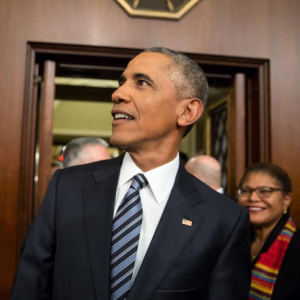President Barack Obama gave his last State of the Union address Tuesday, delivering a speech that was filled with hope and optimism. More important, the president reminded us that “we the people” — emphasizing all people — want “opportunity and security for our families.”
President Obama has consistently reminded us throughout his presidency that we are bound by a common creed, and that our American values of equality, fairness and justice should be available to all, not just the few.
President Obama has largely fulfilled his promise to broaden opportunity to more American families. Whether you look at his accomplishments in regards to supporting working families, reforming the nation’s healthcare system, addressing climate change, improving America’s education system, or tackling our broken criminal justice system, his policy choices over the course of his administration reflect the goal of improving America and moving our country forward.
Underlying each of these policy successes is a commitment to creating a more equitable society. Importantly, President Obama — demonstrating his commitment to ensuring that “all people” truly encompasses all — has worked to ensure that the needs of people of color are meaningfully addressed in such policy decisions.
Historically, people of color have been systematically removed or blocked from participating fully in this country. And, recognizing the harmful legacy of policies that have too often forced communities of color to the margins, President Obama has used his bully pulpit to raise the issue of race on the national level and forced us to confront some of our country’s darkest moments.
In order for all to have an opportunity to succeed, it is necessary that we continue the process of fixing deep structural systems through judicial and legislative actions — whether in the context of voting rights, housing discrimination, economic inequality, or other issues disproportionately affecting communities of color. This takes time and perseverance.
In one of his most powerful speeches — in Charleston, South Carolina, after the horrific shooting of peaceful churchgoers last summer — President Obama called on the nation to look deeper into root causes for inequality. In doing so, the president compelled each of us to face hard truths about the injustices affecting people of color today, and to question whether we as a nation were doing our very best to expand opportunity for all Americans — including the opportunity for a healthy life, a full education and job attainment.
Leading by example, President Obama has also created the most diverse Cabinet in the history of this country, and has worked to ensure that our courts have immensely qualified judges that are not only reflective of society but have a diverse career background.
As our nation becomes more and more diverse, the collective effect of President Obama’s legacy has laid the groundwork for his successor to continue to move our country forward on racial equity. Addressing inequalities in our country is not only the right thing to do, it’s the smart thing to do. By 2044, there will be no clear majority among the American people. This means that, if we want to ensure a strong union, we can no longer continue to support policies or practices that leave people of color behind.
Government — and the policies that it enacts — should reflect the needs of the entire electorate, not just those with the most influence. Instead of treating people of color as an afterthought, we must include them in policy discussions and decisions in a meaningful way. Doing so will only bring success for our country as a whole.
In fact, a 2013 report by the Center for American Progress and PolicyLink shows that, if racial and ethnic differences were eliminated, average total personal income in 2011 would have increased; the nation’s gross domestic product would have been at least $1.2 trillion higher; millions of people would have been lifted out of poverty; and tax revenue at the federal, state and local levels would have increased nearly $200 billion.
As President Obama stated at the end of Tuesday’s State of the Union address, “unarmed truth and unconditional love will have the final word.” As the president navigates his final year in office, he must continue elevating discussions around race and structural barriers that fail to support the growing minority populations in America.
Moreover, these discussions must spur policies that create a more equitable nation. Ultimately, it will be up to his successor to determine if they will continue to build on the great work for racial equity in this country, or instead let opportunity slip by.

